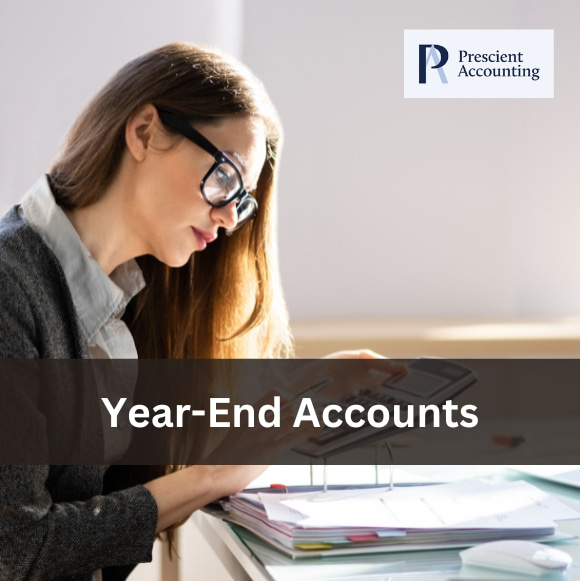


In the UK, it's a legal requirement for all limited companies to submit year-end accounts*, where company information is sent to HM Revenue and Customs (HMRC) and Companies House to calculate the Corporation Tax bill for the financial year. The amount you pay is based on how much profit your business has made in the last tax year.
*Also called 'statutory accounts.'
Year-end reporting summarises the company's activity for a specific accounting period, which is usually one year. The data can be viewed by the public, banks, potential investors, etc., to provide accurate and up-to-date financial information about a particular company.
Year-end accounts can be a complex and time-consuming task for many businesses. Prescient Accounting can help your company compile and submit its year-end accounts efficiently and ensure compliance with UK regulations.

Let us know what you need from your accountants, we’re happy to help.
We believe that the role of the accountant is much more than dealing with pure compliance. That’s why we’re offering a free video or telephone call with one of our team of chartered accountants, to give you straightforward and open dialogue about your tax and accounting affairs.

A typical set of year-end accounts contains four key sections:
This document provides a snapshot of the company's financial position at a specific date, typically the last day of the accounting period. It essentially acts like a financial photograph at that moment, showing what the company owns (assets), what it owes (liabilities), and the difference between the two (shareholders' equity).
This statement summarises the company's income and expenses over the accounting period. It showcases how much revenue the company generated, what its expenses were, and ultimately its net profit or loss for that specific period.
These informal explanatory notes provide additional information and explanations that aren't readily apparent in the balance sheet or P&L. They act like footnotes, offering essential details to better understand the financial statements. Some examples of what might be included in the notes are accounting policies used, significant events that impacted the company's finances, or contingent liabilities (potential future obligations depending on certain events).
This report is a formal document providing a narrative overview of the company's performance and future prospects. It's prepared by the directors and outlines the company's achievements, challenges, and plans for the coming year. It adds context and explains the reasons behind the numbers presented in the core financial statements.
While not a mandatory part for all companies, the director's report is a crucial element for shareholders and other stakeholders to understand what has taken place during the company's financial year beyond the raw data.
Anyone can, in theory, prepare their own accounts for the financial year-end, and there's a great range of accounting software packages available to help you. There's no legal obligation to use an accountant, but you have a duty to ensure that the annual accounts are completed to the required standard.
Most limited companies use a trained and qualified accountant for this task to ensure accuracy.


Yes, it's perfectly okay for someone within a limited company to submit their own Corporation Tax return* (also called the Company Tax return), although many limited companies prefer to ask a qualified accountant. This is partly due to the complex nature of the process, but also because it can save you a lot of time!
*Sole traders, partnerships and individuals don't need to pay Corporation Tax - this is reserved for limited companies.
With our year-end accounts and Corporation Tax service, you can leave everything to our experts!
Here's how we can help you:

Prescient Accounting offers a secure online portal or cloud-based system for you to upload your financial records electronically. This eliminates the need for physical documents and allows for easy access and collaboration between you and the team.
Our team of professionals will categorise your invoices, receipts, bank statements, and payroll information according to UK GAAP guidelines. This ensures all income and expenses are accurately reflected in your accounts, minimising the risk of errors.
Prescient Accounting goes beyond simply processing existing data. We'll proactively identify any missing information or inconsistencies in your records. We'll then work collaboratively with you to obtain the necessary documentation, ensuring a complete and accurate picture of your company's financial health.
We can guide you in implementing a digital record-keeping system if you don't already have one. This system will simplify future data collection and streamline the year-end process for years to come.
Our qualified accountants will review your year-end accounts to calculate how much tax is due and identify any potential tax implications. This includes pinpointing opportunities for capital allowances, tax credits, and reliefs that you might be entitled to claim.
We ensure that all reports are submitted within the deadlines set by Companies House and HMRC to avoid penalties. The fee for late returns varies according to the length of time taken to pay, and the rules and deadlines for submission also vary, so it's wise to keep on top of this.
HMRC and Companies House are notorious for their confusing and complex rules, such as this; you need to file the statement within fourteen days of the due date, which is a year after your incorporation date or the date of the previous statement, even if it is a dormant company.
We'll cut through the jargon and confusion to make sure everything is accurate and submitted on time.
While not strictly connected with the year-end reporting process, it makes sense to sort out your VAT returns at the same time. If you are VAT registered, we can handle this for you as well and make sure you pay the correct amount!

Don't let year-end accounts and corporation tax become a source of stress!
Prescient Accounting can streamline the entire process, ensuring accuracy, efficiency, and tax optimisation. Contact us today for a free consultation and discover how our expertise can save you time and money and allow you to focus on your business.


Year-end accounts, also known as annual accounts, are financial summaries of a company's performance over the fiscal year. They are crucial for tax reporting, informing shareholders of the company's financial health, and aiding in strategic planning.
To prepare your business for year-end accounts submission, gather all financial records, including invoices, receipts, and bank statements. Review your financial activities throughout the year to ensure accuracy in reporting.
Documents needed for preparing year-end accounts include bank statements, invoices, receipts, payroll records, and details of assets and liabilities. This ensures a comprehensive overview of the company's financial activities.
Yes, year-end accounts can be filed online through the HMRC and Companies House portals, streamlining the submission process and ensuring compliance with UK regulations.
The year-end accounts process involves gathering financial records, reconciling accounts, and preparing financial statements that reflect the company's financial performance and position at the fiscal year's end.
The deadline for submitting year-end accounts to Companies House is nine months after your company's financial year ends, while HMRC requires the tax return, which includes the accounts, to be filed by 12 months after the end of the accounting period.


We believe that the role of the accountant is much more than dealing with pure compliance. That’s why we’re offering a free video or telephone call with one of our team of chartered accountants, to give you straightforward and open dialogue about your tax and accounting affairs.